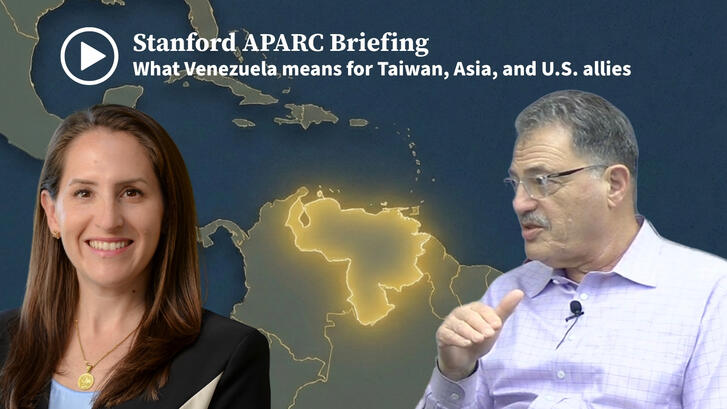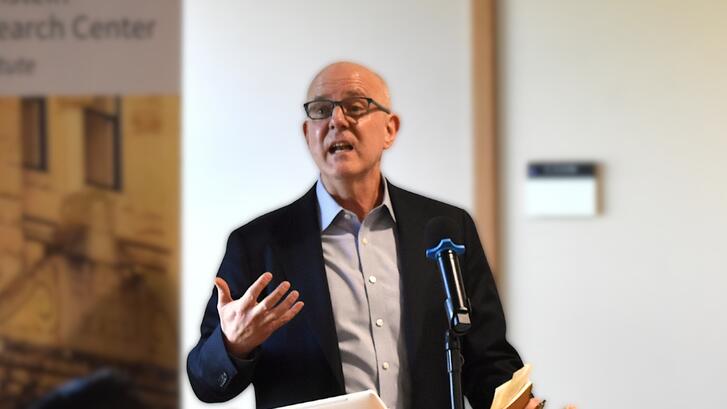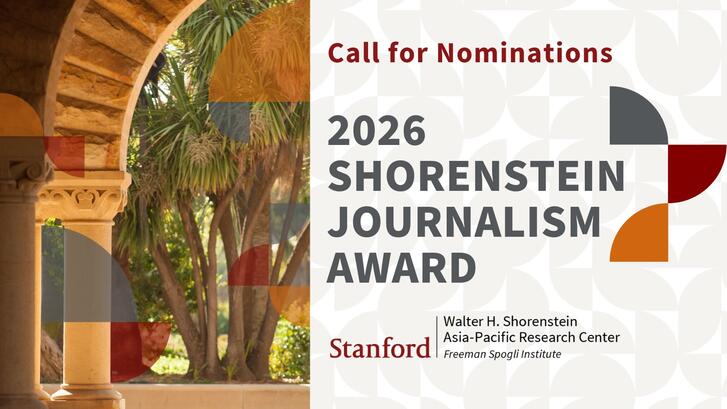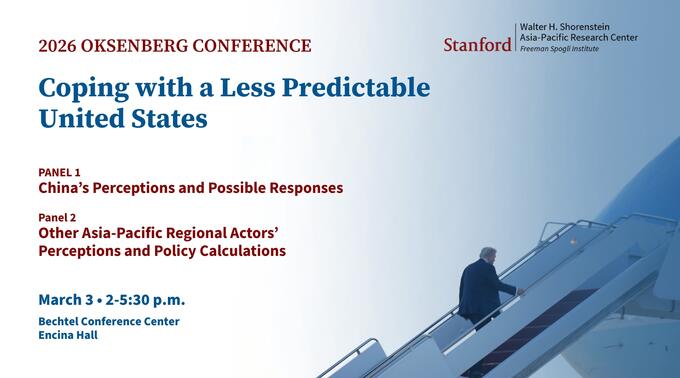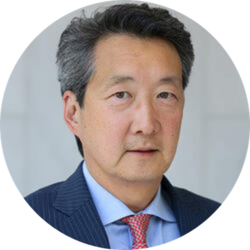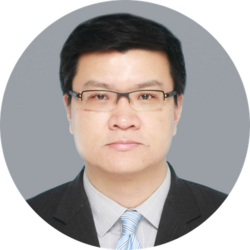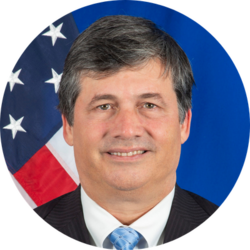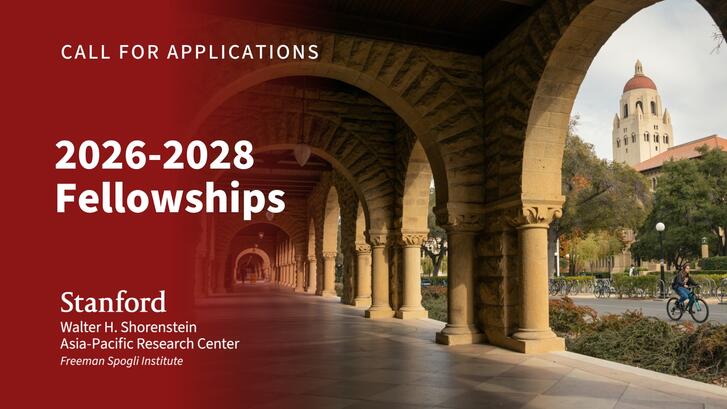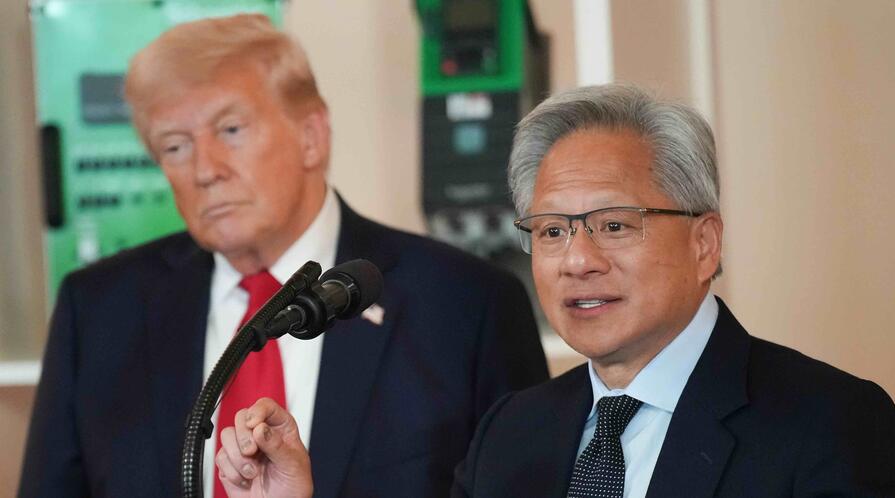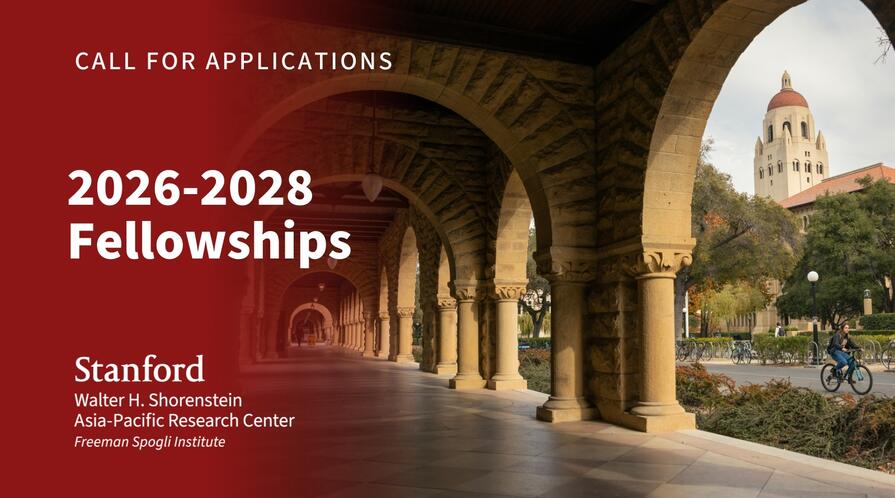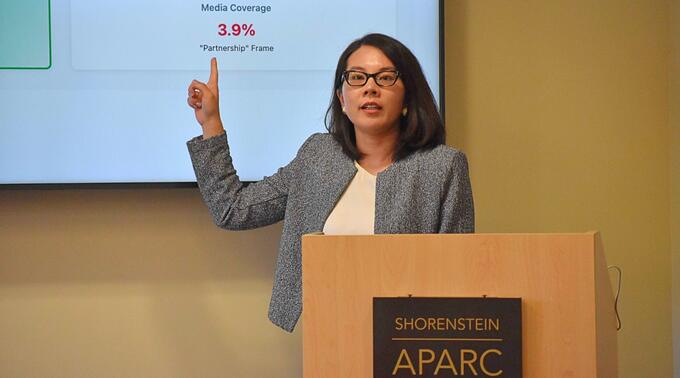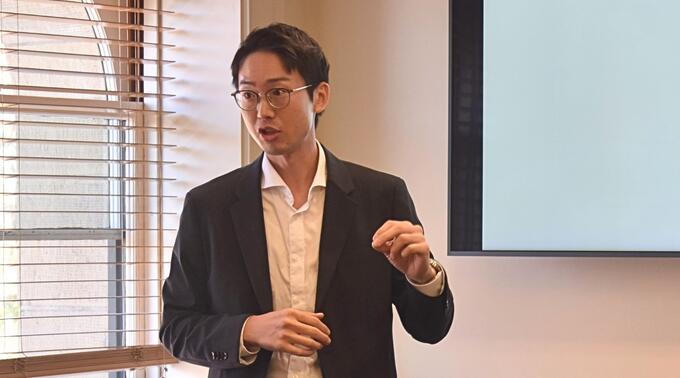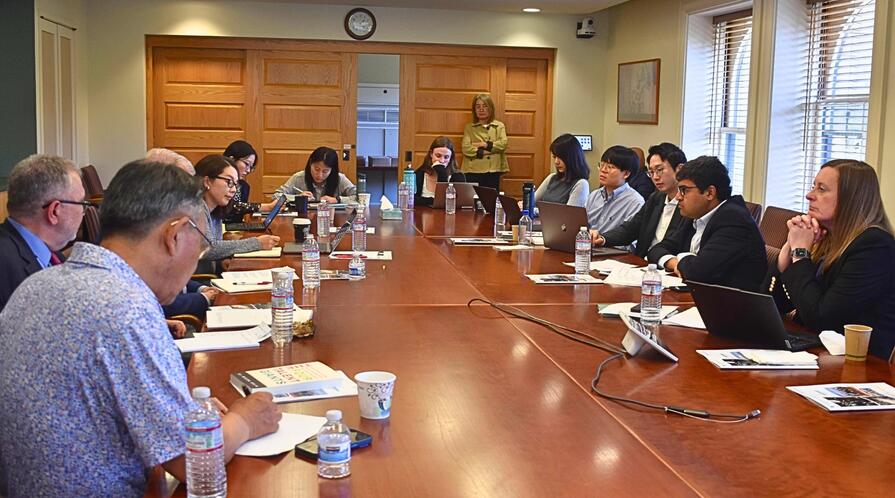TRANSCRIPT:
McFaul: You’re listening to World Class from the Freeman Spogli Institute for International Studies at Stanford University. We bring you in-depth expertise on international affairs from Stanford's campus straight to you. I'm your host, Michael McFaul, the director of the Freeman Spogli Institute.
Today I'm joined by Oriana Skylar Mastro, a Center Fellow here at FSI, an active member of the United States Air Force Reserve, in fact, a recently promoted officer of the Air Force Reserve, and Deputy Director of Reserve Global China Strategy at the Pentagon. Oriana combines all that expertise in her latest book called Upstart, How China Became a Great Power.
I strongly advise you to buy this book. I don't care if you read it, but I want you to buy it now. In all seriousness, I've read lots of books on China in recent years. This is one of the best. It's one-stop shopping for all you need to know about China. It examines China's climb to great power status through a careful mix of strategic emulation, exploitation, and entrepreneurship on the international stage.
So Oriana, let's get right to it. Let's talk about Upstart. So, Upstart sounds like a Silicon Valley topic. Tell us about the title and tell us why you decided to write this book.
Mastro: Maybe I'll start with why I decided to write the book because it leads into the title. In my academic work and in my policy work, looking at how China was building power, the conventional wisdom was the same. Academics called it something a little fancier, but it was basically mirror imaging. There were a lot of arguments being made.
McFaul: What was the academic words? I'm curious.
Mastro: Oh, Kenneth Waltz, like, “emulation,” diffusion” . . .
McFaul: Got it, got it, got it, okay.
Mastro: Kenneth Waltz argued that success breeds the same type of competitive tendencies. Meaning, if you want to be a great power, if you're China in the 1990s, the way to do it is to act like the United States.
McFaul: Right.
Mastro: You go into the policy world and you see the same exact things. Constant arguments about, Is China going to build overseas bases? Is China going to, you know, have a military the same as ours? that were all basically predicated on the understanding that they wanted to mirror image the United States.
McFaul: Right.
Mastro: As a China specialist, I'm a political scientist, I'm also doing this policy work, but I'm also a China specialist. And I speak Chinese, I spend a lot of time in China. And on the surface, it just didn't really make any sense. Like, why would China do exactly what we do? How would that make them competitive?
McFaul: Right.
Mastro: And it really was an introduction in my life to literature on competition from business and management. Partially being in Silicon Valley inspired that, and partially it's because the rise and fall of great powers is very rare, but the introduction and destruction of companies is actually very frequent.
McFaul: Good point.
Mastro: So I discovered this whole other literature on, how are you competitive in trade and in commerce? And a lot of the arguments about competitive advantage, about being entrepreneurial, innovative, trying to find a different way of doing things, really resonated with how I saw China. And so that's what sparked the original idea. It takes writing a whole book to try to convince people that there is very strong evidence and a logical argument for why we have to look at this situation differently than past historic cases of rising powers.
McFaul: Dig into it a little bit. Give us some examples, especially about military power, which is your strong suit. And then if we have time, we'll talk about economic power. So, give us some examples of the “upstart strategy.”
Mastro: So the upstart strategy has three components: emulation, entrepreneurship, and exploitation. Now the first one is based on the conventional wisdom, right?
China does emulate some aspects of U.S. power, but the book tries to evaluate the conditions under which they do so. When are we most likely to see them take the old strategies, whatever the United States is doing, and apply it in the exact same area? That's my definition of emulation.
McFaul: Okay.
Mastro: And they tend to do this when it's reassuring to the United States. So think of examples like engaging in free trade, joining international institutions. In the military realm, they started to participate in humanitarian aid and disaster relief campaigns. They started to participate in peacekeeping operations, right? They're the number one contributor to PKOs on the Security Council of the United Nations.
And so they did decide to do certain things that they thought, Listen, this will help us build power — mediation diplomacy is a great example, helping to mediate between different countries when they're engaged in conflicts —it helps us build power and it makes us look good and it makes the United States calmer about our rise. Because one of the main reasons why you don't want to act exactly like the United States, is that actually could seem very threatening, right?
If you're trying to build the exact power the United States has, it would be very easy for people in the United States to say, Hey, wait a minute, what's going on here?
McFaul: Right.
Mastro: Right? And the example I give, if China built overseas bases, like our network of 120 bases, we would have seen that a lot differently than what they ended up doing, which was the Belt and Road Initiative, like economic policies. So those are in the emulation category.
For military power, most of them are about reassurance. And then there's a few times where they have such a competitive advantage and this area of power is so important that even though there's a downside in terms of how the U.S. will perceive it, they go for it anyway.
So, an example in the military realm is building what we call C4ISR network, or Command Control Computers Communication Intelligence Surveillance Reconnaissance, which in the most simple way...
McFaul: That's what — ISR, you just spelled out the acronym, right?
Mastro: Yeah, right.
McFaul: Thank you.
Mastro: So in the most simple sense, it's building a space architecture.
McFaul: Right.
Mastro: Having their own navigation systems, having their own precision timing, you know. So, they realized that was really important for the nature of warfare. They needed it. The United States might not like it, but it was just so necessary. And because their engineers are cheaper, because they're actually really advanced in certain missile technologies, they knew they would have an advantage there.
McFaul: Right.
Mastro: So that's emulation. Exploitation is when they use the U.S. strategy, but in an area where the United States isn't competing. There's disincentives to do it directly. And this largely could be because of competitive advantages. So one area is like arms sales, Chinese arms sales around the world. China really only sells arms to countries that cannot buy them from the United States. Either because they're under some sort of human rights arms embargo, they’re poor countries that are not strategically relevant enough to be gifted arms by the United States, so the Bangladeshes of the world get a lot of their military equipment from China.
McFaul: Because they're too poor? I did not know that.
Mastro: Yeah, well, Chinese stuff is a lot cheaper. Now, there's some countries who are poor that still have U.S. stuff, but that's because we've decided, like . . .
McFaul: They're important.
Mastro: They're important for strategic reasons, so we have gifts and loans and things. And then there's certain technologies that because of treaty obligations, the United States wasn't exporting. And this is how China got sort of a stronghold in the market on unmanned systems, for example. On the diplomatic side, elite visits, right? A Chinese leader like Xi Jinping makes as many overseas visits as a U.S. president, but they go to fundamentally different places, right?
McFaul: Right.
Mastro: The U.S. president is mainly going to the UK, Germany, Japan, Australia. Chinese president is visiting Africa.
McFaul: A lot.
Mastro: A lot! So Xi Jinping has visited three times more countries than President Obama did, and President Obama visited more African countries than any previous U.S. president. He also goes to the poorest countries in the world, the 70% of the poorest African countries Xi Jinping has been to, that no U.S. president has ever been to. So it's kind of filling in those gaps.
And then the military realm, for those of you out there with military background, the example that's just perfect for this is something we refer to as A2/AD, or the Anti-Access/Area Denial strategy.
What is that? Very simply put, China deliberately evaluated the types of things the United States needs to project power, and then they developed specific capabilities to target those. So things like the aircraft carrier. So China developed a missile designed to hit and sink an aircraft carrier, right? Or a need to refuel because our bases are far away, you know, or blinding satellites because we need satellites more because we don't have the home-court advantage.
McFaul: Right.
Mastro: So in the military realm, this exploitation strategy is very strong.
And the last category, entrepreneurship, is when they do something completely different. And this, I would say, is the most controversial aspect of the book. I briefed it to a lot of military audiences. Just on Friday I got a note that a four-star wanted my address to send me a letter about the book. And I'm like, Is this– I don't know if it's going to be like I loved your book or it's gonna be like I hate everything you say about the following chapters, because it is a Navy admiral.
So I imagine that they're sensitive about, one, my argument that China is not seeking an overseas basing network despite all the concerns over the past 20 years that they're, you know, they're on the cusp and they're going to build when they're going to build one. One of the reasons China sometimes does things differently from the United States is that they think U.S. strategy is stupid. So, one of the parts of the argument is trying to look at how China might change in the future. And it's important, the rationale.
McFaul: Right.
Mastro: So the book looks at thousands of Chinese . . .
McFaul: Startups are not always startups, right? They get old, and…
Mastro: . . . They evolve. This book relies on thousands of Chinese sources to also evaluate the rationale of why they chose certain strategies. So you could imagine if they chose a strategy because they were weaker or didn't have an advantage, as they get more powerful, they might start emulating.
But this is an aspect when they're like, you know, the war in Afghanistan cost the equivalent of ten Belt and Road Initiatives. Why would we be engaged in sort of foreign military intervention, which tends to go hand in hand with these overseas basing networks, when we can achieve our goals better with economic and political means of power? And that's outside of Asia. China does clearly want to dominate Asia militarily, but they don't need bases for that because they have China.
So, that's one of those arguments that says this is not for lack of ambition. Of course, they will have certain military roles in some places. We'll probably see some more intelligence gathering, you know, sensors being put places, but not offensive combat operations.
And the second very controversial one is about China's nuclear forces. And I had a follow-up piece in The Economist last month by invitation to talk about China's nuclear arsenal. China has, basically, since 1964, every aspect of their approach to nuclear weapons has been different than the United States: posture, doctrine, readiness, delivery systems, number of nuclear weapons, structure of the organization for nuclear weapons.
I mean, besides the initial decision to build them for the sake of nuclear deterrence, nothing has been the same. And part of that, again, is about inefficiency arguments, that China never understood why the United States needs thousands and thousands and thousands of them. And from a competitive point of view, up until the mid 2000s, the United States spent more on its nuclear weapons than China spent on its whole military.
McFaul: Wow.
Mastro: So, one of the reasons they've been able to get this conventional power that people like me write very openly about being concerned of, right? I'm not as concerned about their nuclear weapons. But, I'm absolutely concerned about the tipping of conventional power in China's favor. They've been able to do that by not overspending on nuclear weapons.
McFaul: Right.
Mastro: So there's a lot of debate right now because they're increasing their numbers. They used to just have like 200 and 320. There's a debate right now about whether or not they're going to push up to 1,000 or 1,500 in the next 10 years. But even so, I sort of argue that there's other reasons for that, dealing with advancements in technology and changes in U.S. doctrine that has made them concerned that their deterrent has weakened.
McFaul: Their nuclear deterrent has weakened.
Mastro: Their nuclear deterrent has weakened. And so they still have the same sort of minimal deterrent posture that they've had before. So that hasn't changed. But those are kind of the two most controversial entrepreneurial areas that I discuss in the book on the military side.
McFaul: So, if you had the chance to . . . in fact, I learned this term from military folks when I worked in the government: the BLUF, right? “Bottom line up front”. Really great phrase for all people having to do briefings.
But if you got, say, 45 seconds with President Trump, and he asked you, Lieutenant Colonel - can I call you that now?
Mastro: Yeah, sure. Yeah.
McFaul: Lieutenant Colonel Mastro. He probably wouldn't call you Dr. Mastro, but Lieutenant Colonel Mastro.
Mastro: He'd probably be like, “Hey lady!” But, yeah. Yeah.
McFaul: Congratulations on being Lieutenant Colonel, by the way. That's a fantastic achievement. But if he just asked, What's the balance of military power between the United States and China today? How could you answer that in 45 to 60 seconds?
Mastro: I would say that we're outgunned in Asia. We have the advantage everywhere else. We're deterring China from a large-scale protracted war.
But the problem is in conflicts close to China, in particular over Taiwan, the United States is outgunned. And we need to put more bombers, submarines, and land-based missiles closer into China, which means we have to be nicer to countries in the region because they have to agree to let us put that stuff there. And we have to reform the defense industrial complex so that we can innovate in those areas, in particular land-based anti-ship ballistic missiles, and be able to produce them in mass in a cost-effective way.
McFaul: Fantastic answer. You know how to do this. I can tell.
Mastro: You usually get more than 45 seconds, but sometimes they get right to it.
McFaul: You hit it, I saw it. Now we have a little more time to dig into that. Because that was a very profound thing you just said. Take us through the pieces that you think are inadequate. And then let's talk about whether the Trump administration will begin to realize those solutions. But first, just articulate the threat posture that — you had three big buckets there — maybe more, but I heard three. Tell us a little more in detail about what is alarming about that balance of power in Asia to you?
Mastro: So, if you can humor me, right before I do that, I just want to really hammer home a point that I said in that answer, that I feel is clouding some of the debates among policy experts and academics, okay?
McFaul: Please.
Mastro: Which is, we are adequately deterring China from engaging in a large-scale war with the United States. So people are always like, China doesn't want to fight a war with the United States and all of our allies and partners. And, the economic costs will be huge. And it's like, yes, but that is not what people in the defense department are worried about. We're not worried that tomorrow China attacks the United States and we're fighting World War III.
McFaul: Right.
Mastro: What we're worried about is that there are certain aspects of contingencies like Taiwan that they can move and gain, in this case, control over Taiwan before the U.S. military can come in mass. Okay? And the coming in mass is just a more diplomatic way of saying, Before we can really start blowing things up. So, let me just start with that because what people say . . .
McFaul: That's very important. I'm glad you did that. Yeah.
Mastro: It's very important because it's not the case that I think, like, China's like, gunning for whatever. Or, I do a lot of media interviews when I'm walking my kids to and from school and once my four year old was like, “Does the United States lose all the wars that we fight?” after they hear me on the phone, I'm like, “Mom did not say that!”
What I'm saying is that there's this particular scenario, and if China initiates conflict, they're going to initiate it when it's most favorable to them.
So the problem is, the United States, we have forces close to Taiwan, right? In Japan, for example. But there are so few of them that if we actually mobilized them after the immediate attack on Taiwan, for example, they're not survivable. Which, again, is the military diplomatic speech of saying everyone is going to die.
And if that were credible, if China thought we were going to do that, then they're in the major war with the United States, right? They’ve just killed thousands of Americans. So, that doesn't become appealing. But the logic is, most U.S. presidents are not going to send in those forces — in this case, it's mainly air power — when they're all going to die. And then we also lose in this sort of exchange about 70% of our most advanced aircraft? Which means then, now we're transitioning to that major war with China. It's like, we're not in a great position.
McFaul: Right.
Mastro: So we have stuff there, but we don't have enough. The question is like, what does enough mean? Very simply, you gotta keep the ships that are carrying the people across the strait from landing on Taiwan. And so, I'm kind of a broken record on this with the military when people are always like, “Well I'm contributing to deterrence. You know, I'm doing this dance, I'm doing this messaging.” Or even certain weapon systems like, well, you know, “I got this tank . . .”
I'm like, if it does not sink ships, I do not care. Right? Because then you're in this realm of cost in which people say they're trying to deny China the objective of Taiwan, but really it's like, well, I could sink a ship or two. And I'm like, well, when you got thousands of them, you know, one or two is not going to do it.
McFaul: Right.
Mastro: So the thing I laid out, basically, are designed to sink a lot of ships quickly. Submarines, the United States has the advantage undersea still. There's an apocryphal story that I talk about in my book that when they devised that strategy to target the key platforms of the United States in the 1990s, the Navy, for some odd reason, was changing their patrolling schedule. So the submarines just weren't patrolling them.
And so when China was like, we got to get the aircraft carriers, we got to get the satellites. We got to hit the fixed bases where the aircraft are taking off. They just didn't think of the submarines, you know? So that's the story. I don't know how true it is, but that's the apocryphal story.
So we have, full reign with submarines. The problem is we just don't have a lot of them.
McFaul: Right.
Mastro: And then the munitions they carry, they can only sink a few ships. And then we have no capability to replenish them in the region. So they have to go all the way back to Guam or Hawaii. So I talk about tenders, submarine tenders, a lot of military personnel being like, I need that stuff and I need it in the Philippines and Japan. Like, that's where we need it.
McFaul: Right.
Mastro: And then the bombers are very controversial because those are an offensive capability that are designed to penetrate into China and bomb mainland targets. Mike, we're just throwing it out there. That's what they do.
McFaul: That’s what they do.
Mastro: That's important because the biggest threat are all the missiles that China is going to be shooting at us.
McFaul: Right.
Mastro: Missile defense on the back end is hard, like missiles coming towards you. It's a lot easier if you just took out the launcher where it's coming from.
And so that's really what that is about. Like, okay, if we're going to stop all these missiles from being shot at Taiwan, from being shot at our carriers, from being shot at our bases that we need to operate, we're going to have to get in there, we're going to have to take care of it, and that's where the strategic bombers come from.
And then the last component was the land-based anti-ship ballistic missiles.
McFaul: Right.
Mastro: Missiles are a lot cheaper than everything else. Because they're land-based, they tend to be more powerful, more precise. There is a deterrent against China, just a little bit more, because they have to attack the country where the missiles are based.
McFaul: Right. Good point.
Mastro: That's an additional thing that imposes caution on them. So yeah, those are the things that I would want more than anything else. And I really believe that if we put those things in place and so China couldn't do this quickly, the two-and-a-half to three weeks that they might consider, that they'll never do it.
And then this problem will just persist forever, but at least we won't fight a hot war over it. So that's why I really focus on some of those issues and focus on just understanding that China sees a lot of things differently than we do. So, that's what really the book… the heart of the book is about convincing people to keep an open mind about how they're understanding and interpreting Chinese actions so that we can be more entrepreneurial ourselves about how to deal with great power competition.
McFaul: That's a great point. Your recommendations are crystal clear. Who is listening in the Trump administration? And I mean that as our last question.
Don't talk about the specifics, but at the end of the Trump administration, as you know better than I, they focused pretty heavily on diagnosing the China threat. And they put out all sorts of speeches. And Secretary Pompeo did this big long paper about the threat.
It's a little curious to me, and it's only a few weeks, of course, so let's give them time, but it's a little curious to me how we're focused on a lot of other things besides what you just described so far.
Is that unfair or is it too early? And what do you expect in the coming weeks and months in terms of the Trump administration doing some of the things that you just outlined?
Mastro: Well, I think the fact that it's been quiet, I'm very hopeful.
McFaul: Mmm. Explain that, that's good!
Mastro: Because generally speaking, you want the experts to have the space to do the things they need to do. And I see a lot of those policies being driven by some of the domestic political stuff. Like we know tariffs is not going to help anyone get their jobs back, but the people who voted for President Trump believe that.
And so when you say, Who is listening? I mean, this is one of the main reasons that 15 years ago I enlisted in the military, when I was doing my PhD at Princeton, is because people explained to me the pathways that academics could be influential.
And I thought, Okay, so I could write an op-ed and hope someone read it and hope they did this. Or I could go into government, which is a great pathway, but as a woman who, I knew I wanted to have children, the in and out of government thing could be disruptive to the move, and I didn't want to wait 10 to 15 years before I got to do anything interesting.
McFaul: Right.
Mastro: So, for me, there are people listening. I feel like I do have the ear of some pretty important people. And then, as someone who works in the system, I make changes directly.
So I get to see, here's the national defense strategy. It's done. Here's our war plan. It's done. Here's our force posture, our force modernization. I get to physically just go in there and change it and then hope no one notices and changes it back.
But that's how I tend to focus on my influence. And as long as the Trump administration, the more they stay out of that space, the easier it will be, I think, for us to devise good effective strategies.
So if you have that top level of support, and respect for the expertise of the people in the building, which I think we've seen some signs that maybe that's going to be a problem, you know, we'll give them the benefit of the doubt. They respect their military advisors and that expertise. Then we can really make some advancements.
My biggest concern is that we're going to upset a lot of other countries in the region. And Biden made a lot of improvements in our force posture by getting countries to agree to certain things, in particular, Japan and the Philippines and Australia and some second island, you know, Pacific Islands, that if that's reversed, it's going to make it harder for us to deter China.
So I just hope that . . . the way I articulate it to people who have some of those more isolationist views, or unilateralist views, is like, this isn't about your love for this other country or even about multilateralism or legitimacy. If you want the United States to be powerful and that you want to do whatever you want, you need to have these countries willing to host you.
Hopefully they won't disrupt those relationships too much. But on the other hand, they're not as worried about provoking China, which a lot of my recommendations, like with the bombers or something, previous administrations might be like, Oh, I don't know, that might be a little touchy.
McFaul: Right.
Mastro: But maybe with the Trump administration, they're like, yeah, get in there, what you need to get in there. So there could be some pros and there could be some cons, but I think it takes this type of academic research is important because then we can really stand from a position of knowledge and authority and confidence, when you're making arguments that are controversial that people might push back on, that, at least I believe they better inform policy.
So, I stick to them even when people try to push back in more emotional ways about stuff. I think that is really the role of the academic practitioner, and I hope this book serves that purpose.
McFaul: Well, that's one of the most optimistic things I've heard in the first weeks of the Trump administration. As long as they're not talking about the issue, that's a good sign, not a bad sign.
And we can't see what you write for the Pentagon and inside the Pentagon and who you brief, but we can read your book, and everybody should. It's called Upstart: How China Became a Great Power. Thanks for talking with us about some of the ideas here. And I encourage everybody to go out and get this book.
Mastro: Thank you, Mike.
McFaul: Thanks for being here.
You’ve been listening to World Class from the Freeman Spogli Institute for International Studies at Stanford University. If you like what you’re hearing, please leave us a review. And be sure to subscribe on Apple, Spotify, or wherever you get your podcasts, to stay up to date on what’s happening in the world and why.
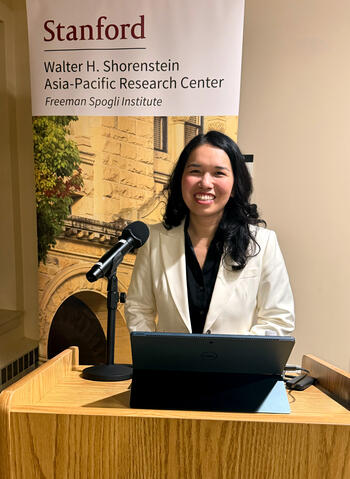


 FSI researchers strive to understand how countries relate to one another, and what policies are needed to achieve global stability and prosperity. International relations experts focus on the challenging U.S.-Russian relationship, the alliance between the U.S. and Japan and the limitations of America’s counterinsurgency strategy in Afghanistan.
FSI researchers strive to understand how countries relate to one another, and what policies are needed to achieve global stability and prosperity. International relations experts focus on the challenging U.S.-Russian relationship, the alliance between the U.S. and Japan and the limitations of America’s counterinsurgency strategy in Afghanistan.